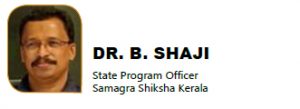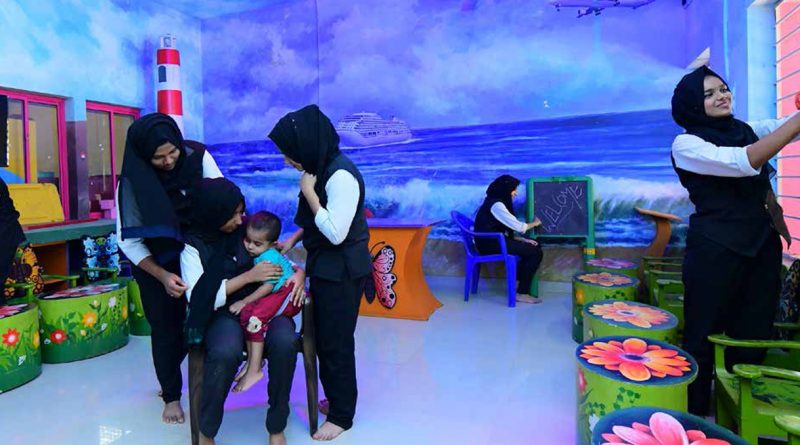The Changing Landscape

National Skill Qualification Framework (NSQF) in General Education Kerala has been implemented successfully in the State of Kerala at the Higher Secondary level from the academic year 2018-19 onwards under the scheme of ‘vocationalisation of School Education under Samagra”. The scheme is escalated and 48 job roles from 21 different sectors are being instructed in 1100 batches of 389 Higher Secondary Schools – Vocational, as part of NSQF. Around 30000 students are enrolling in these courses every year. Since the job roles available in the PSSCIVE’s (Pandit Sunderlal Sharma Central Institute for Vocational Education, a constituent unit of NCERT) list are insufficient and inapt, the State started to take suitable job roles directly from the National Qualification Register (NQR) too. Kerala has the highest number of NSQF job roles in the school sector, especially at the higher secondary level.
Skill Development Centers
The proposed Skill Development Centres in the State aim to produce competent youths below 21 years at a decent work regime that would ensure a good standard of living. Skill Development Centers (SDCs) are to be established under the STARS (Strengthening Teaching Learning and Results for States) Scheme, with 40% share by the State Government and 60% by the Central Government as well as financial support from the World Bank. 210 SDCs will be started soon from the approved 236 ones under this project. The centres in each district were selected by District administrators such as District Collectors, District Panchayat Authorities, and the officials from the Department of General Education. The selection was done by ensuring at least one SDC in every Block so that every student in the State would have access to the skill ecosystem. The list of SDCs was then approved by the State Government. The suggested courses (Job roles at Level 3/4) were finalized by the State level team under the headship of the Director of General Education by analyzing the skill gap studies and training supports available in different parts of the State. Maximum efforts were taken to select new-generation courses, and these were allotted to schools in such a way that the same course will not be an existing one in the HSS – Vocational. SDCs offer an opportunity to those who missed formal vocational education during their school days. The centres aim to develop skills among Out of School Children who complete class X, students registered in SCOLE Kerala, and Higher Secondary and Higher Secondary – Vocational students. There will not be any course fee and some seats will be reserved for the students belonging to socio-economically weaker sections. Separate batches / enough reservations will be given to different categories of Children with Special Needs. There will be 2 job roles from different sectors and 25 students per batch in each SDC. Even though the minimum qualification for entry to the course is Class X, the qualifications prescribed by national curricula are necessary.
Training Delivery
The training delivery will be done by establishing good labs, hiring good trainers, and through good partnerships with industries. Labs with enough tools and equipment will be established in these schools. Construction for 50 SDCs has been approved and will be started soon. Industry Experts’ Interactions and On Job Training will be part of the curricula. These activities, along with placements will be done with the support of ‘Industry Training Partners’ in each Center. Apart from the course curricula developed by SSCs, a foundation module consisting of Life skills, Entrepreneurship Skills etc. will also be imparted to all students who enter the SDCs. Proper career counselling and motivation will also be given for designing their career path. The assessment process will be done by the Examination Wing of the Department of General Education (VHSE Wing) and the responsibility for implementation is given to the Department of General Education (VHSE Wing) and Samagra Shiksha Kerala. A Research wing in the State will be effective for “skill gap analysis”, for Q- filing the required curricula, developing curricula for the job roles from NQR, ensuring quality in skilling, etc.
Partnerships in Skill Development Centers
Proper implementation of SDCs will be ensured through the fruitful collaboration of various departments such as Industries, Local Self Government and Labour Departments. Quality skill training will be ensured with the help of Industries and Sector Skill Councils (SSC). It is planned to get support from various industry organisations and labour organisations at all levels. The right skill development can empower the young community of the state of Kerala, reduce unand underemployment, increase productivity, and improve the standard of living. The development of skills can contribute to structural transformation and economic growth by enhancing employability and labour productivity and helping the state to become more competitive in the Knowledge Economy. In future, these SDCs will be developed as “Centres of Skill Excellence” with the help of the Skill Centre Development Committee to be formed. Vocationalisation of school education from the primary can be effectively done through these centres in the hub and spoke model. It will also be a great asset for the local community where other skill training of different agencies can also be conducted at the same centre with optimal utilisation of resources.


